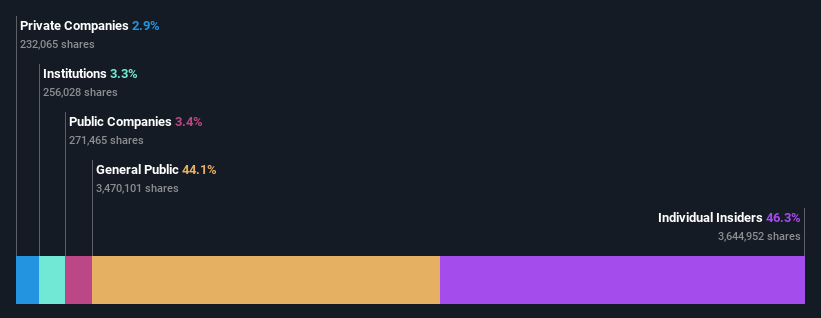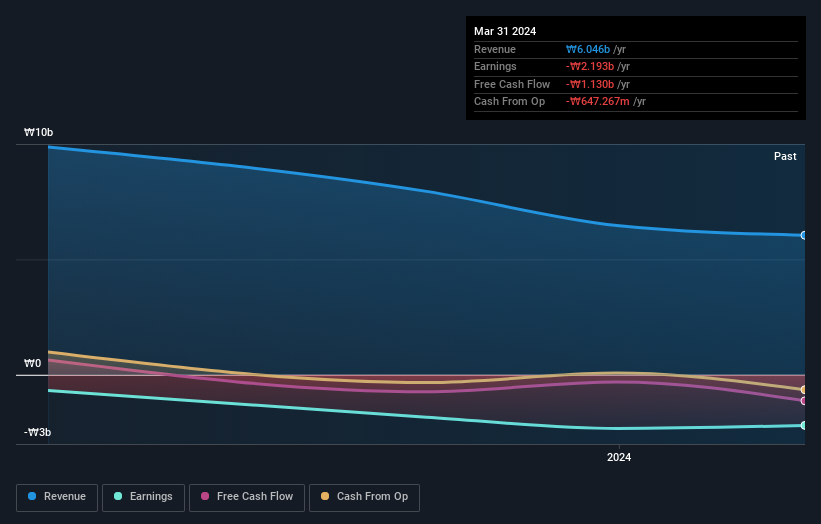- South Korea
- /
- Semiconductors
- /
- KOSDAQ:A451220
IMT Co., Ltd. (KOSDAQ:451220) insiders, who hold 46% of the firm would be disappointed by the recent pullback

Key Insights
- Insiders appear to have a vested interest in IMT's growth, as seen by their sizeable ownership
- A total of 6 investors have a majority stake in the company with 51% ownership
- Past performance of a company along with ownership data serve to give a strong idea about prospects for a business
To get a sense of who is truly in control of IMT Co., Ltd. (KOSDAQ:451220), it is important to understand the ownership structure of the business. The group holding the most number of shares in the company, around 46% to be precise, is individual insiders. That is, the group stands to benefit the most if the stock rises (or lose the most if there is a downturn).
And last week, insiders endured the biggest losses as the stock fell by 16%.
Let's take a closer look to see what the different types of shareholders can tell us about IMT.
Check out our latest analysis for IMT

What Does The Institutional Ownership Tell Us About IMT?
Institutional investors commonly compare their own returns to the returns of a commonly followed index. So they generally do consider buying larger companies that are included in the relevant benchmark index.
Less than 5% of IMT is held by institutional investors. This suggests that some funds have the company in their sights, but many have not yet bought shares in it. If the business gets stronger from here, we could see a situation where more institutions are keen to buy. When multiple institutional investors want to buy shares, we often see a rising share price. The past revenue trajectory (shown below) can be an indication of future growth, but there are no guarantees.

IMT is not owned by hedge funds. Our data shows that Jaesung Choi is the largest shareholder with 24% of shares outstanding. Meanwhile, the second and third largest shareholders, hold 15% and 3.4%, of the shares outstanding, respectively.
On further inspection, we found that more than half the company's shares are owned by the top 6 shareholders, suggesting that the interests of the larger shareholders are balanced out to an extent by the smaller ones.
While it makes sense to study institutional ownership data for a company, it also makes sense to study analyst sentiments to know which way the wind is blowing. We're not picking up on any analyst coverage of the stock at the moment, so the company is unlikely to be widely held.
Insider Ownership Of IMT
While the precise definition of an insider can be subjective, almost everyone considers board members to be insiders. The company management answer to the board and the latter should represent the interests of shareholders. Notably, sometimes top-level managers are on the board themselves.
I generally consider insider ownership to be a good thing. However, on some occasions it makes it more difficult for other shareholders to hold the board accountable for decisions.
Our most recent data indicates that insiders own a reasonable proportion of IMT Co., Ltd.. Insiders have a ₩73b stake in this ₩157b business. It is great to see insiders so invested in the business. It might be worth checking if those insiders have been buying recently.
General Public Ownership
The general public, who are usually individual investors, hold a 44% stake in IMT. This size of ownership, while considerable, may not be enough to change company policy if the decision is not in sync with other large shareholders.
Public Company Ownership
Public companies currently own 3.4% of IMT stock. This may be a strategic interest and the two companies may have related business interests. It could be that they have de-merged. This holding is probably worth investigating further.
Next Steps:
It's always worth thinking about the different groups who own shares in a company. But to understand IMT better, we need to consider many other factors. Like risks, for instance. Every company has them, and we've spotted 4 warning signs for IMT (of which 2 are potentially serious!) you should know about.
Of course this may not be the best stock to buy. So take a peek at this free free list of interesting companies.
NB: Figures in this article are calculated using data from the last twelve months, which refer to the 12-month period ending on the last date of the month the financial statement is dated. This may not be consistent with full year annual report figures.
New: AI Stock Screener & Alerts
Our new AI Stock Screener scans the market every day to uncover opportunities.
• Dividend Powerhouses (3%+ Yield)
• Undervalued Small Caps with Insider Buying
• High growth Tech and AI Companies
Or build your own from over 50 metrics.
Have feedback on this article? Concerned about the content? Get in touch with us directly. Alternatively, email editorial-team (at) simplywallst.com.
This article by Simply Wall St is general in nature. We provide commentary based on historical data and analyst forecasts only using an unbiased methodology and our articles are not intended to be financial advice. It does not constitute a recommendation to buy or sell any stock, and does not take account of your objectives, or your financial situation. We aim to bring you long-term focused analysis driven by fundamental data. Note that our analysis may not factor in the latest price-sensitive company announcements or qualitative material. Simply Wall St has no position in any stocks mentioned.
About KOSDAQ:A451220
Excellent balance sheet very low.
Market Insights
Community Narratives




